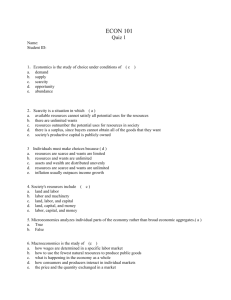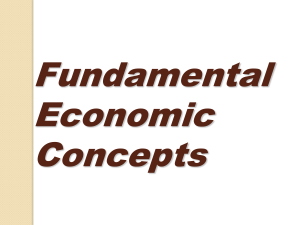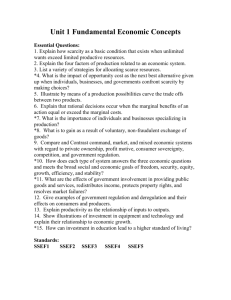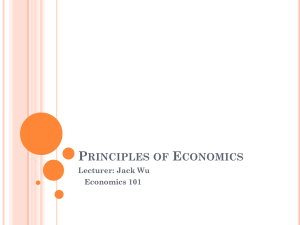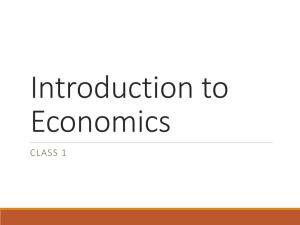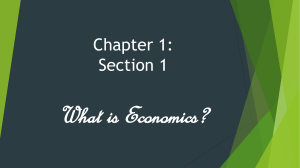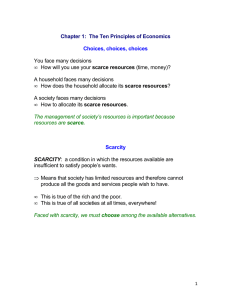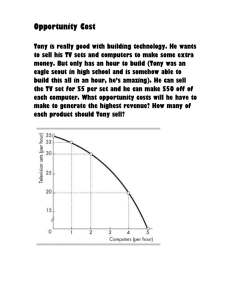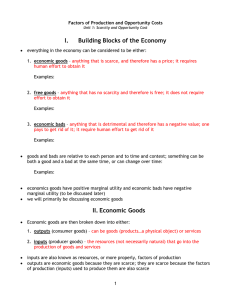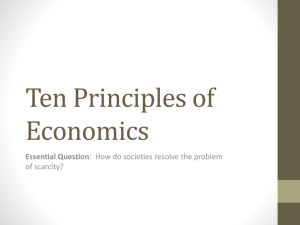What is Economics?
advertisement
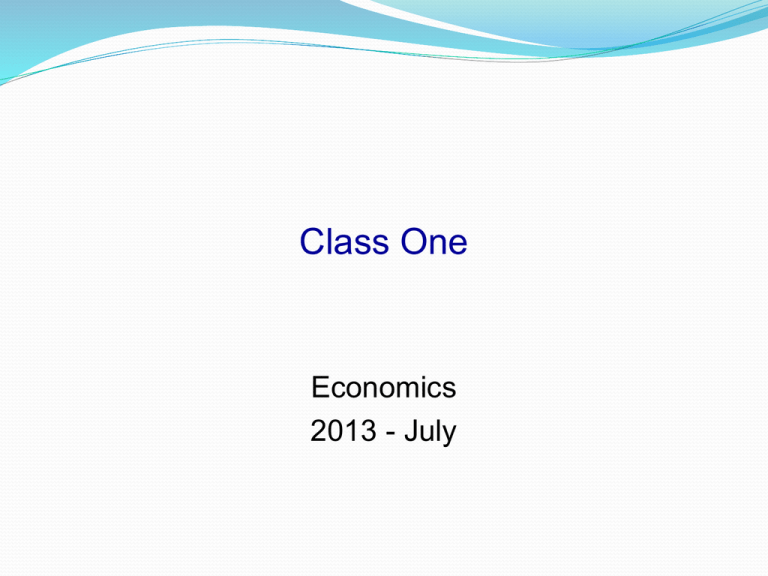
Class One Economics 2013 - July Decisions!!! A household and an economy face many decisions: Who will work? What goods and how many of them should be produced? What resources should be used in production? At what price should the goods be sold? Scarcity Society and scarce resources: The management of society’s resources is important because resources are scarce. – Scarcity means that society has limited resources and therefore cannot produce all the goods and services people want. What is Economics? • Economics is the study of how society manages its scarce resources. 1: People face trade-offs To get one thing, we usually have to give up another thing. guns or butter leisure or work efficiency or equity Productivity or a clean environment ‘There is no such thing as a free lunch!’ Making decisions requires trading off one goal against another. The dilemma Efficiency or equity – Efficiency means society gets the most that it can from its scarce resources. – Equity means the benefits of those resources are distributed fairly among the members of society. 2: The cost of something is what you give up to get it Decisions require comparing costs and benefits of alternatives. Whether to come to class or go home? Whether to watch the cricket match or take your family for dinner? The opportunity cost of an item is what you give up to obtain that item. 3: Rational people think at the margin • Marginal changes are small incremental adjustments to an existing plan of action. • What is a rational person? 4: People respond to incentives Marginal changes in costs or benefits motivate people to respond. The decision to choose one alternative over another occurs when that alternative’s marginal benefits exceed its marginal costs. MB > MC – an action is performed What are incentives? 5: Trade can make everyone better off People gain from their ability to trade with one another. Competition results in gains from trading. Trade allows people to specialize in what they do best. The oranges and apples example! 6: Markets are usually a good way to organise economic activity A market economy is an economy that allocates resources through the decentralised decisions of many firms and households as they interact in markets for goods and services. Firms decide who to hire and what to produce. Households decide what to buy and who to work for. A command economy is when a centralized body decides the above. 7:Governments can sometimes improve market outcomes • Market failure occurs when the market fails to allocate resources efficiently. When the market fails (breaks down) government can intervene to promote efficiency and equity. Externalities – Positive vs Negative Market Power – Monopolies 8: The standard of living depends on a country’s production A country’s standard of living may be measured in different ways: By comparing personal incomes. By comparing the total market value of a nation’s production. Productivity is the amount of goods and services produced from each hour of a worker’s time. 9: Prices rise when the Government prints too much money Inflation is an increase in the overall level of prices in the economy. One cause of inflation is the growth in the quantity of money. When the government creates large quantities of money, the value of the money falls. 10: Society faces a short-term trade-off between inflation and unemployment Inflation = Unemployment In the short run, an increase in the quantity of money stimulates spending, which raises both prices and production. The increase in production requires more hiring, which reduces unemployment. Factors that changed the world we live in Democracy The Limited Liability Company Patent Rights Literacy and Education. The factors of production Land – Natural resources Labor – the mental and physical skills of individuals in society Capital – tools that are used in production. Economics answers the following 3 questions What to produce? How to produce? For whom to produce? Macroeconomics vs Microeconomics Microeconomics is a branch that studies how individuals, households and firms make decisions to allocate scarce resources. Macroeconomics is a branch of economics that deal with the performance, structure, and behavior of national and regional economies as a whole Ceteris paribus Is Latin for “other things being equal” In constructive models, economists make assumptions to eliminate unnecessary details to reduce the complexity of behaviour. Positive vs normative economics Positive economics Descriptive statements, claims how the world is. (Scientists) Normative economics Prescriptive statements claims how the world ought to be. (Policy Advisors)
